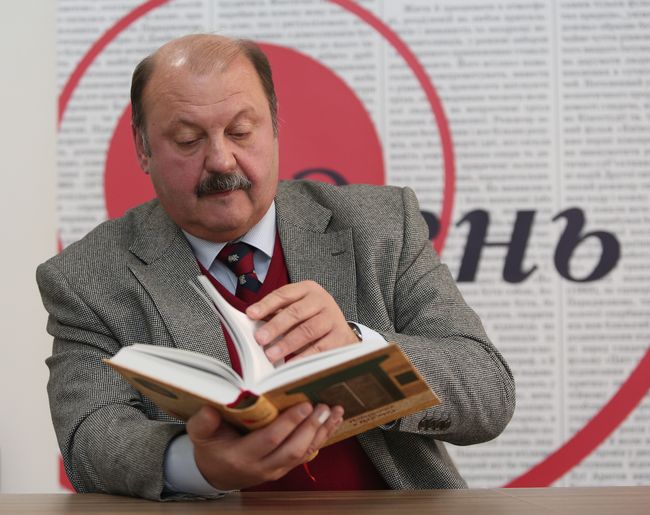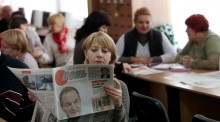“THE BOOK RETURN TO TSARHOROD SHOULD BE A SCHOOL MANUAL”
Iryna ALOSHNINA, pensioner; Kremenchuk, Poltava oblast:
“My husband and I buy Den every day. We have been reading your newspaper for eight years now and have thus come to know about your new books. I’ve almost finished reading ‘The Trap,’ or A Case without a Statute of Limitations. I like this publication very much. The book cites some facts, which I did not know, although I closely follow political news. Undoubtedly, the Gongadze case has no statute of limitations. Unfortunately, very few people in our city with a population of 100,000 read or even know about this kind of publications. Naturally, I tell everybody about Den and its projects. Valentyn Torba and Serhii Hrabovsky are among my favorite authors. I always read Larysa Ivshyna’s meaningful articles with pleasure. I have now a shelf stacked with Den’s books, such as The Power of the Soft Sign and Two Rus’s, as well as your new products Return to Tsarhorod and I Am an Eyewitness. Return to Tsarhorod is a manual of sorts. It should be a history textbook for schools. For our entire history was twisted, and our – older – generation was taught God knows what, and even now nobody knows the true history of Ukraine. But it is very important. I read Return to Tsarhorod with great interest in a burst of inspiration, as if it were a whodunit.”
“THIS BOOK IS FOR THE GENERATION OF YOUNG UKRAINIANS”
Mykola KULINICH, Ambassador Extraordinary and Plenipotentiary of Ukraine to Australia:

Photo by Ruslan KANIUKA, The Day
“The very emergence of such a book as Return to Tsarhorod is an event for Ukraine. History must be open to all. It is very important that this is being done by enthusiasts who are the prime movers of intellectualness in Ukraine.
“Whenever I communicate with Den’s editor-in-chief Larysa Ivshyna, I even perceive history differently. Some people have a talent to see something new in the things that look commonplace and which we got accustomed to. It is the talent of an innovator who can feel the new in the old. It is one of the rarest talents a human being can have.
“Publications are often referred to as ‘scholarly research.’ Return to Tsarhorod is not only more than a piece of research, but also more than a book. It is a major event in our society. In Ukraine, this publication seals off a large ‘breach’ in societal thinking. I can only thank Ms. Ivshyna and all the enthusiasts who took part in the publication of this book. It is a genuine pleasure to hold the book in your hands, for it is designed in a Byzantine style.
“I am pleased that we are getting back to this kind of editions. This Den’s Library book is not just an informational resource. You can’t just skim through it over the morning cup of coffee. To read it, you need to be duly prepared, have time, and be in a proper mood. It is of great value in our conditions. To read this book, I must mobilize myself and schedule my time.
“Return to Tsarhorod is perhaps not for my generation, for I am one of the people who view history as achievements of past generations. This book is for the generation of young Ukrainians who are keenly aware of the necessity to reconsider their history. This is extremely important because a nation can only form and consolidate if it knows its own history.”
“DEN HAS GATHERED MATERIALS FOR EVERYONE TO READ”
Volodymyr DANYLENKO, bookstore owner, reader of Den, Skadovsk:
“When Den announced its new books, I knew I would surely be asked to procure some. This was also the case with Return to Tsarhorod. As soon as it was possible to acquire the book, I ordered several copies for myself and for the store. I have already sold some. I also gradually read. I think this publication and The Power of the Soft Sign complement each other very well by content. Return to Tsarhorod is a very topical book about our history. Den has again gathered material for everyone to read. What particularly gripped me were the texts on Cossacks. It seems to me that if the state had supported book publishing and this kind of projects back in the 1990s, we wouldn’t have the current mess – first of all, in human minds, in our perception of the historical and political situation. And perhaps we would have no war.”
“COLLECTION EDITORS SUGGEST LOOKING AT THE PAST FROM THE VIEWPOINT OF NOT ONLY CONFRONTATION, BUT ALSO EVERYDAY LIFE”
Dmytro KAZYMYROV, executive secretary, Rozumovsky Meetings collection of scholarly publications; Candidate of Sciences (History):
“This book is not only about Ukraine regaining its place in Europe and the world or about dropping the black-and-white patterns imposed on us from abroad. It highlights the mistakes, which we must try to avoid now. At first glance, the publication is about the commonly-known historical events. But it prompts us to take a fresh look at and reconsider them, revise the stereotypes that have moved from Soviet historiography to the mass awareness of present-day Ukrainian society. For example, a label of historical enemies of the Ukrainian people was attached for a long time to representatives of the Oriental world, such as Turks and Tatars. So the collection editors suggest looking at the past from the viewpoint of not only confrontation, but also everyday life which forced Ukrainian Cossacks and Crimean Tatars to coexist and help each other in the conditions of a rich, albeit sometimes inclement, nature of the North Black Sea Coast, as well as to form alliances and take joint actions.”
“THE BOOK SHOWS ONE OF THE ASPECTS THAT BRING TOGETHER UKRAINIANS AND CRIMEAN TATARS – THE POSITION OF THE WOMAN”
Liudmyla CHABAK, project manager, Siversk Institute of Regional Studies; Candidate of Sciences (Philosophy):
“The collection’s texts are very diverse. They are read and perceived differently. Some can be read at one fell swoop, while others require that the reader have a specialist background and be able to reconsider things. Yet all the articles encourage debating and developing a critical attitude. They seem to be sinking the reader into the past but, at the same time, they hold him or her in the context of today and are sometimes aimed at the future. Moreover, the past and the future are closely intertwined here. We can see an aspiration to link history and culture, as far as their impact on life is concerned. The book appeals to the feeling of pride for our multifarious and bright history. Tellingly, it is not only about the history of Ukraine in the narrow sense of the word, but also about the history of the other peoples that populated our lands, especially the Crimean Tatars. In particular, the book shows one of the value-related European aspects that bring together Ukrainians and Crimean Tatars – the position of the woman.”







